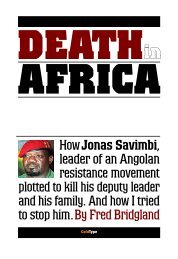- Page 1 and 2:
“[This] may well turn out to be g
- Page 4 and 5:
Comments on The Crime of Our Time
- Page 6:
“Danny ranges wide over the polit
- Page 9 and 10:
THE CRIME OF OUR TIME WaS the econo
- Page 12 and 13:
Contents Preface By Larry Beinhart,
- Page 14 and 15:
PrefaCe By Larry Beinhart Dear Pros
- Page 16 and 17:
Boesky accepted a plea bargain. Thr
- Page 18 and 19:
MUsICaL PrefaCe/ soUnD traCK Plunde
- Page 20:
“Denial is the refusal to acknowl
- Page 23 and 24:
xx lies losing their homes. After a
- Page 25 and 26:
xxii analysis. There may be journo-
- Page 27 and 28:
xxiv “The investigation is the la
- Page 29 and 30:
xxvi then so clearly an economic bo
- Page 31 and 32:
xxviii I was well aware of all the
- Page 33 and 34:
xxx Special thanks to ColdType.net
- Page 35 and 36:
xxxii offs have taken a heavy toll
- Page 37 and 38:
xxxiv of failures were cited - a fa
- Page 39 and 40:
xxxvi borrowers would not be able t
- Page 41 and 42:
xxxviii any illusion that public or
- Page 43 and 44:
xl eclipses the S&L debacle in term
- Page 45 and 46:
xlii The requirement of a liquid fi
- Page 47 and 48:
xliv • This environment was enabl
- Page 49 and 50:
xlvi fundraiser, “This is an impr
- Page 51 and 52:
xlviii But there were many who saw
- Page 53 and 54:
l Commenting in the Atlantic magazi
- Page 55 and 56:
lii white-collar criminals build ar
- Page 57 and 58:
liv wrong doers are to be brought t
- Page 60 and 61:
CHAPTER 1 THE MADOFF MOMENT BEFORE:
- Page 62 and 63:
the SEC’s Division of Enforcement
- Page 64 and 65:
sands of clients had $65 billion. B
- Page 66 and 67:
‘How am I supposed to find the se
- Page 68 and 69:
Noting that “for decades, Mrs. Ma
- Page 70 and 71:
11 And what about the victims? What
- Page 72 and 73:
13 kerage called Cohmad) was a “p
- Page 74 and 75:
15 In early September 2009, the SEC
- Page 76 and 77:
in which we took them, along with h
- Page 78 and 79:
19 These suggestions may or may not
- Page 80 and 81:
21 ber #3 was Norman Schmidt who ra
- Page 82 and 83:
23 in this case, I would suspect th
- Page 84 and 85:
violent and physical crimes. If som
- Page 86:
about them, namely investigations a
- Page 89 and 90:
30 Times’ Gillian Tett worries th
- Page 91 and 92:
32 Over 730,000 counts of suspected
- Page 93 and 94:
34 didn’t think that they, how co
- Page 95 and 96:
36 So there you have it - the same
- Page 97 and 98:
38 The victims of corporate crimina
- Page 99 and 100:
40 attracted a slew of illustrious
- Page 101 and 102:
42 use the “borrowed” money to
- Page 103 and 104:
44 inside deals, require less artis
- Page 105 and 106:
46 “Because we measure the effect
- Page 107 and 108:
48 White House is not going to be t
- Page 109 and 110:
50 it; so they set it up, not as a
- Page 112 and 113:
CHAPTER 6 wHO sHOulD bE prOsEcuTED?
- Page 114 and 115:
ecause of a failure of a number of
- Page 116 and 117:
state, in the grip of the early-Rea
- Page 118 and 119:
CHAPTER 7 iNVEsTigATiNg FiNANciAl c
- Page 120 and 121:
estimate the strength of hostile el
- Page 122 and 123:
former executives running the feder
- Page 124 and 125:
As readers know, I have stated many
- Page 126 and 127:
CHAPTER 8 cOuNT 1: prEDATOrY subpri
- Page 128 and 129:
I interviewed him at length. He is
- Page 130 and 131:
In the November 2006 study we expla
- Page 132 and 133:
They write: 73 Those who are allege
- Page 134 and 135:
75 fact, mechanically more interest
- Page 136 and 137:
General Andrew Cuomo labels as a sc
- Page 138 and 139:
79 It is hard not to feel that her
- Page 140:
81 Research Service Report in Augus
- Page 143 and 144:
84 a little piece of the layer of a
- Page 145 and 146: 86 A former Vice President of Stand
- Page 147 and 148: 88 sion in which he examined one ho
- Page 150 and 151: CHAPTER 11 cOuNT TwO: wAll sTrEET c
- Page 152 and 153: 93 tion, vast resources were transf
- Page 154 and 155: Flanders then asked Black to bring
- Page 156 and 157: CHAPTER 12 COUNT THREE: THE INSURER
- Page 158 and 159: AIG’s later role in escalating th
- Page 160 and 161: 101 BILL MOYERS: Is it possible tha
- Page 162 and 163: 103 you might have seen an opportun
- Page 164: 105 not a question most media outle
- Page 167 and 168: 108 eling but there was no discussi
- Page 169 and 170: 110 scamming them - and there is tr
- Page 171 and 172: 112 earnings were being created. Th
- Page 173 and 174: 114 out at his former colleagues du
- Page 175 and 176: 116 There is an unfortunate dialect
- Page 177 and 178: 118 advertising money sloshing arou
- Page 179 and 180: 120 It was startling to watch a Fox
- Page 181 and 182: 122 I pressed Starkman on whether t
- Page 184 and 185: CHAPTER 15 THE BEAR STEARNS “BLEE
- Page 186 and 187: as collateral to obtain overnight l
- Page 188 and 189: 129 DS: Around 11 am they watch the
- Page 190 and 191: 131 was financing and forcing the b
- Page 192 and 193: 133 hearing about a mortgage being
- Page 194 and 195: 135 Bamber replied, “Absolutely,
- Page 198: STEWART: But isn’t that financial
- Page 201 and 202: 142 this was a turning point in the
- Page 203 and 204: 144 the credit-market collapse that
- Page 205 and 206: 146 Shock Doctrine, in which a majo
- Page 207 and 208: 148 Doctor Housing Bubble, Lehman B
- Page 209 and 210: 150 management of internal risk and
- Page 211 and 212: 152 In the aftermath of his company
- Page 213 and 214: 154 the price of oil kept rising sh
- Page 215 and 216: 156 The government has machinery in
- Page 217 and 218: 158 The reports on it are sketchy,
- Page 219 and 220: 160 system. And while there is some
- Page 221 and 222: 162 tronically printed cash and buy
- Page 223 and 224: 164 this is where all the money is
- Page 225 and 226: 166 “Bernanke is being praised fo
- Page 228 and 229: CHAPTER 18 THE TESTOSTERONE FACTOR
- Page 230 and 231: 171 prostitutes exposed in each win
- Page 232 and 233: 173 “Sexualize?” I asked him, h
- Page 234: 175 There was another cultural phen
- Page 237 and 238: 178 non-governmental think tanks re
- Page 239 and 240: 180 $5 BILLION IN POLITICAL CONTRIB
- Page 241 and 242: 182 ing the post of Treasury Secret
- Page 243 and 244: 184 AP explained. “The report sai
- Page 245 and 246: 186 In Obama’s speeches across th
- Page 247 and 248:
188 financial system because if you
- Page 249 and 250:
190 ing at a snail’s pace.) Johns
- Page 251 and 252:
192 parency for derivatives as a re
- Page 253 and 254:
194 structure of the economy itself
- Page 255 and 256:
196 predators are not getting away
- Page 257 and 258:
198 current big finance) vs. centri
- Page 259 and 260:
200 tions of power still associate
- Page 261 and 262:
202 all trapped inside the bubble a
- Page 263 and 264:
204 officials who knowingly misled
- Page 265 and 266:
206 The chances of a just outcome a
- Page 267 and 268:
208 Wall Street’s behavior may be
- Page 269 and 270:
210 are not ones we can count on. W
- Page 271 and 272:
212 Schechter’s professional jour
- Page 273 and 274:
214 1999 A Hero for All: Nelson Man
- Page 278:
From the Author of PLUNDER, WHEN NE
















